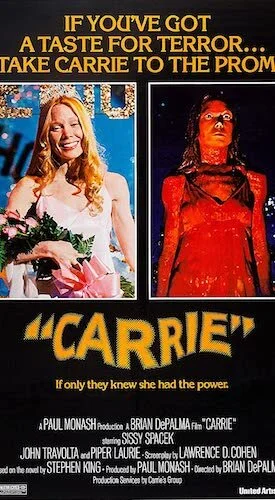Carrie: 31 Days of Horror
For all of October, we will review horror films. Submit your requests here, and you may see your picks selected!
When Brian De Palma was getting comfortable in his own auteur shoes, he began deciding what his vision could bring to other tales. The Phantom of the Opera and Faust became Phantom of the Paradise. Eventually, Blow-Up would become Blow Out eventually. At one point, like many other filmmakers, he wanted to try his hand at a Stephen King adaptation: Carrie, in this case. Now, Carrie also happens to be my favourite King novel, and one where his horror storytelling just rolls off the page so organically. So, a film version already has some of the work cut out for it. It just so happens that De Palma’s Carrie is similarly strong, as it is possibly the best King adaptation (certainly the greatest King horror story adaptation, anyway), even to this day. With King’s observational storytelling and De Palma’s obsession with flash, Carrie becomes a New Hollywood horror tale that bends conventions without going overboard (a problem De Palma often has).
Speaking of De Palma, what I do like is how he held himself back when it comes to Carrie White’s maturation and menstruation. De Palma usually relishes excessiveness and exploitation in his films, but he tried his best to be respectful to these themes. Could a different director — female or male — have been even more understanding? Probably, but I do give kudos to De Palma for not using these themes as tools for horror or edginess, as he has done with other topics before and after (in problematic ways). Instead, Carrie White is a regular teenager who happens to be bullied due to her naivety surrounding her puberty, all thanks to her suffocatingly strict mother. Just like in King’s novel, White begins to channel the psychic powers she discovers into teen anguish; when her bullies and mother go too far, so does she.
Carrie White’s prom-gone-wrong has become a staple in horror cinema.
Highlighting many high school events (including sports, classes, hallway conversation, and even prom night), Carrie is a checklist of all of the places White has been plagued, only for her turmoil to boil over. This is where De Palma shines, as her retaliation is vicious, and you feel each and every ounce of White’s frustration and humiliation, cultivating in a fiery bloodbath of comeuppance. You can’t condone what she does, but you’re in a very strange position where you don’t blame her tantrum, either (despite the innocent people that get wrapped up in this disaster). White’s insecurities take over, and she hallucinates additional reasons to snap (even though she had many real scenarios that I think would do the trick to many people, especially that pig blood).
Remaining fairly faithful to King’s story, De Palma does take a couple of liberties which result in great decision making for the big screen. White dealing with her mother in the novel is morbid, but it wouldn’t have translated well into an early ‘70s film. Instead, De Palma goes for the sacrilegious, countering the obsessive Christian teachings of Mrs. White used to stymie her daughter. It’s much more memorable image wise, and it wraps things up entirely: instead of Carrie staying a good girl with all of the Christian teachings, Mrs. White has lost Carrie in every way for good (even as a Catholic). De Palma’s vision ends off on the aftermath of a terrible event, only to be punctuated by the worst jump scare of all: impending trauma that can strike at any second. It’s a shocking final touch that shows that De Palma is actually very aware of how horror can be utilized. Whether it’s prom being a literal hell, toxic parenting resulting in the opposite intended result, and bystanders being caught in the middle between bullies and victims, Carrie encapsulates many token high school experiences and turns them into unforgettable horror episodes. Even though Brian De Palma has flown off the rails enough times to make you question him, it’s times like Carrie where I’m reminded that he does know what he’s doing fairly well (when he wants to).
Andreas Babiolakis has a Masters degree in Film and Photography Preservation and Collections Management from Ryerson University, as well as a Bachelors degree in Cinema Studies from York University. His favourite times of year are the Criterion Collection flash sales and the annual Toronto International Film Festival.






